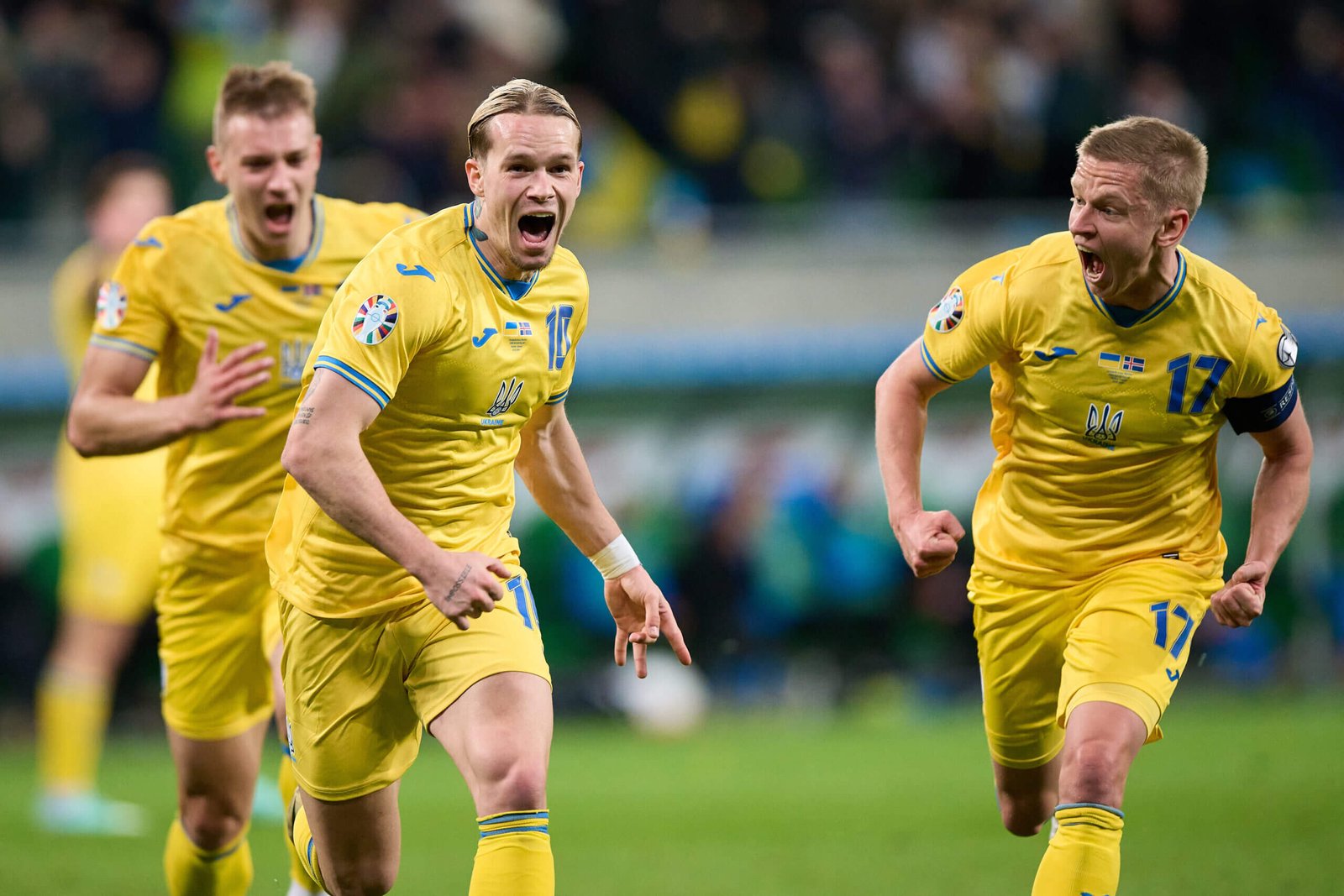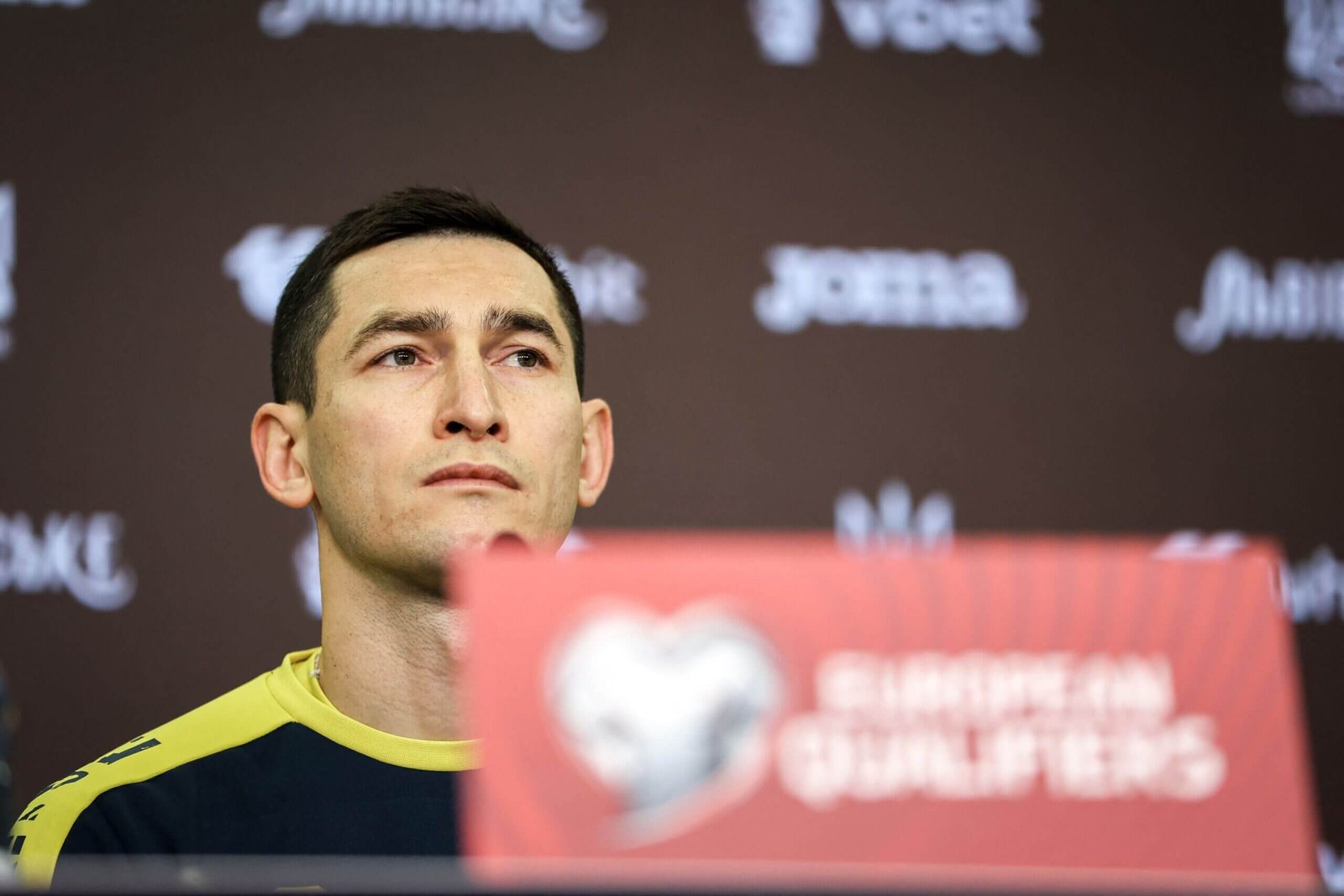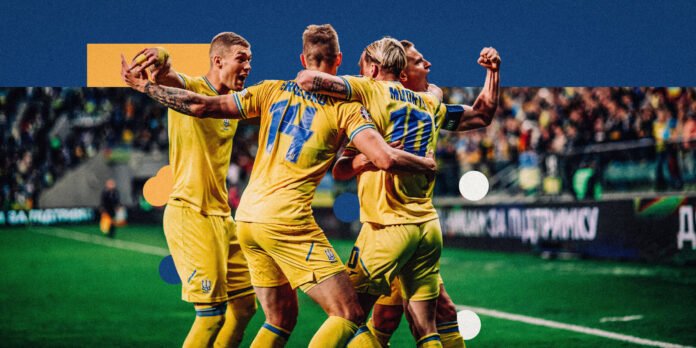Despite a wealth of talent, Ukraine only got to the tournament via the play-offs and they didn’t make easy work of that. Of course, the invasion by Russia and the ensuing war has overshadowed the team’s achievements. They have not played at home since 2022 and the football is trivial in comparison, but hopefully, those talented players will get their chance to shine in the European spotlight.
The manager
There was an element of destiny to Sergei Rebrov becoming Ukraine’s head coach.
Andriy Shevchenko had a go, leading his country at the last European Championship, but his former strike partner and fellow national hero took over in 2023. If it was a sentimental appointment, you can understand why: if ever a national team needed an emotional connection to its manager, it is Ukraine right now. The war with Russia is into its third year and they have not played a genuine home game since March 2022.
But Rebrov wasn’t simply appointed to make everyone feel nice and fuzzy. He has a genuine coaching pedigree, having won league titles in three countries: two in Ukraine with Dynamo Kyiv, three in Hungary with Ferencvaros and one in the UAE with Al Ain.
How to follow Euro 2024 on The Athletic…
Being Ukraine manager at the moment seems to be a curious hybrid role of coach and statesman. Rebrov summed up the dichotomy of having a genuinely promising team representing Ukraine at a major tournament, with the backdrop of everything happening back home, when World Soccer magazine recently asked him how they celebrated qualifying for the tournament.
“There were pleasant emotions in the dressing room,” he said. “But overall it was impossible to fully concentrate on the celebration. There is a war in our country and people die every day.”
Ukraine’s head coach Sergei Rebrov (Gapon/AFP/Getty Images)
The household name in waiting
A name you may already recognise if you’re a keen student of the gossip columns is Shakhtar Donetsk’s Heorhii Sudakov. Probably the best young talent left playing for a Ukrainian club, Sudakov, 21, is an attacking midfielder with a directness and passing range that reminds you of a young Kevin De Bruyne. He is not at De Bruyne’s level, but Sudakov is one of the brightest sparks in a talented squad.
However, he has never played domestic football outside of Ukraine and it will be interesting to see what happens to him after the tournament. Will Mykhailo Mudryk’s inconsistent form with Chelsea put off potential buyers? Or would a good tournament allay those fears?

Up-and-coming talent, Heorhii Sudakov (Lars Baron/Getty Images)
Strengths
There is real strength in depth in this Ukraine squad. A case in point is that Ruslan Malinovskyi, Andriy Yarmolenko and Roman Yaremchuk could easily go to the tournament and not get a game.
They have Real Madrid’s Andriy Lunin in goal, a stacked midfield that should feature Sudakov, Oleksandr Zinchenko, Girona’s Viktor Tsyhankov and Mudryk, with La Liga top goalscorer Artem Dovbyk up front.
Most of those are playing for top European clubs and most have enjoyed brilliant seasons. None of which is a guarantee of international success, but it’s a decent start.
Weaknesses
The team is exceptionally young. There’s a decent chance that the starting XI for their opening game against Romania could only feature one player over 30 and the rest no older than 28. This isn’t inherently a negative, but tournaments like this often require an old head or two. There could be a lot of emphasis on Taras Stepanenko to provide that experience.
They qualified via the play-offs (after being drawn in a tough group, with England and Italy), and rode their luck there: they were losing until the 85th minute in the semi-final against Bosnia & Herzegovina and also went behind in the final against Iceland before a late Mudryk winner sealed their spot in Germany. The ability to come back from behind is valuable, but it’s the actual going-behind part that can’t become a habit.

Mykhailo Mudryk celebrates scoring for Ukraine against Iceland (Rafal Oleksiewicz/Getty Images)
Thing you didn’t know
This section is usually reserved for something fairly light-hearted: an amusing song, perhaps, or an animal who has become a mascot.
But with Ukraine, it’s tricky to avoid rather more serious matters.
Several members of the national team have been involved in fundraising and work to help the war effort. Most have donated money. Zinchenko was appointed by President Volodymyr Zelensky as an ambassador for the country’s official fundraising initiative and helped organise the charity match in London last year.
But perhaps the most prominent figure has been Stepanenko. The 34-year-old Shakhtar Donetsk midfielder was at home in Kyiv when the war started and had to hide with his family in their basement for three days. Eventually, his wife and three children managed to escape to Spain.
As soon as they were safe, he began work to raise money for the war effort, initially for things as basic as medical aid for soldiers, but his work has evolved into a broader effort to help the relatives of those killed in the conflict through an initiative called Stand For Heroes.
Maybe more than all of this has been an acknowledgement that Stepanenko, Zinchenko and all of the Ukraine players are not simply footballers anymore, but idols of hope and ambassadors for their country.
“Our job now is not solely to be footballers,” Stepanenko said when he was nominated for a FIFPro Merit award at the end of 2023, “but to help support and protect our people, especially children.”

Taras Stepanenko last season (Leon Kuegeler/AFP/Getty Images)
Expectations back home
Despite what the country is going through, expectations are high for this tournament. Partly that’s a bit of a distraction technique: as is often the case, football is now an escape from the realities of Ukrainian life, a source of joy in an otherwise bleak landscape.
But it’s also because this is a legitimately good set of players, arguably the most promising and talented that Ukraine has ever sent to a European Championship — at least since the coach’s day.
As Turkey discovered in 2021, declaring a team as ‘dark horses’ for the tournament is a tricky business, but it would be easy to overlook, given what is happening to the country as a whole, their potential to make an impression in Germany.
Ukraine preliminary squad
Goalkeepers: Andriy Lunin (Real Madrid), Anatoliy Trubin (Benfica), Heorhiy Bushchan (Dynamo Kyiv)
Defenders: Yukhym Konoplia (Shakhtar Donetsk), Valeriy Bondar (Shakhtar Donetsk), Mykola Matvienko (Shakhtar Donetsk), Oleksandr Tymchyk (Dynamo Kyiv), Vitaliy Mykolenko (Everton), Maksym Taloverov (LASK), Illia Zabarnyi (Bournemouth), Oleksandr Svatok (Dnipro-1)
Midfielders: Taras Stepanenko (Shakhtar Donetsk), Oleksandr Zubkov (Shakhtar Donetsk), Heorhii Sudakov (Shakhtar Donetsk), Andriy Yarmolenko (Dynamo Kyiv), Volodymyr Brazhko (Dynamo Kyiv), Mykola Shaparenko (Dynamo Kyiv), Serhiy Sydorchuk (Westerlo), Ruslan Malinovskyi (Genoa), Mykhailo Mudryk (Chelsea), Viktor Tsygankov (Girona), Oleksandr Zinchenko (Arsenal)
Attackers: Artem Dovbyk (Girona), Roman Yaremchuk (Valencia), Vladyslav Vanat (Dynamo Kyiv)
Reserves: Dmytro Riznyk (Shakhtar Donetsk), Danylo Sikan (Shakhtar Donetsk), Vladyslav Kabayev (Dynamo Kyiv), Vladyslav Buyalskyi (Dynamo Kyiv), Denys Popov (Dynamo Kyiv), Yehor Yarmoliuk (Brentford)
(Top photos: Getty Images; design: Eamonn Dalton)
Read the full article here


